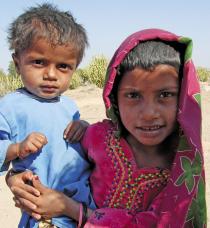On a recent, very hot, Sunday afternoon I was sitting in a bus at the bus stand of Mirpurkhas City in the interior of Sindh province, Pakistan. A vendor boarded the bus carrying a jug and two glasses, hoping to sell a cold drink to passengers. From his appearance, I surmised that he was a Sindhi Muslim who was working hard to eke out a subsistence living.
In the seat just in front of me sat a Parkari Kholi father and his daughter of about six years. Parkari Kholi are tribal people and therefore considered to have no caste, which socially places them with a status well below those who belong to the accepted caste system. The little girl and her father wanted a cold drink. Instead of pouring the drinks into his two glasses, the vendor put them aside and instead served the drinks one after the other in a special aluminum tumbler that he had taken out of his pocket. Why the tumbler and not the glasses? The aluminum tumbler designated the low status of the father and his daughter in society. The vendor considered himself of superior status to the family.
This story demonstrated that while the language of caste may not be used much nowadays in Pakistan, the prejudice and discrimination it embodies are still very much part of people’s daily reality. Like the father and daughter, the Christian community is an "outsider" because of its religious status, caste status and socio-economic status. The marginalization Christians experience because of their low status is accepted within the wider society and in some cases is enshrined in the law of the land. Even though Pakistan is predominately Muslim, the caste mentality and the practices that stem from it continue to persist.
Origins of the caste system
The caste system developed out of early Indian civilization. It was legitimized and perpetuated by the Hindu religion. Later religions in the Indian Sub-continent such as Buddhism, Islam and Christianity all found it difficult to unravel the tentacles of the caste mentality, which is a deeply internalized phenomenon among their followers. "If you are human, you have caste. If you don’t have caste, you are not human," describes this internalised world view.
This is central to understanding why those in positions of power and leadership are not motivated to help the poor and marginalized in their midst.
Classical Hinduism is divided into four racially-based castes in descending order-Brahmins, Kshatriya, Viasya and Sudra. To belong to one of these groups gives a person caste. A person has the same caste as his or her parents and observes certain rules of purity.
Beneath the four castes are a fifth group of people who are the "Untouchables" and who are outside the caste system. These are considered so low that "Untouchables" are forbidden to touch anyone who belongs to one of the other four castes. If a Brahmin priest touches an "Untouchables", he must go through a ritual cleansing. "Untouchables" do all the most unpleasant work in south Asia, like cleaning up human waste. They are forced to live on the outskirts of towns and villages. The story of the father and his daughter illustrates that the caste system still impacts greatly on those who are considered "Untouchables".  Columbans work with the "Untouchables"
Columbans work with the "Untouchables"
It is among these "Untouchable" people that Columbans live and work, primarily because this is the background of the vast majority of Christians in Pakistan. The largest of these ethnic peoples are Punjabi, and they make up 98% of the Christian community in Pakistan. They are traditionally the people who swept the streets and cleaned the sewers. Their ancestors began what became known as a mass movement into Christianity beginning in the 1870’s at the height of colonialism and which continued into the 20th century. The main reason for doing so was a search for a new identity and a place where they would be accepted.
It was not until the 1940’s that the first Parkari Kholi and other tribal groups became Christian. The Parkari Kholis are one of several Hindu tribal peoples, mostly living in Sindh, who work predominantly as bonded labourers for feudal landlords. Traditionally they have also been considered "Untouchables".
The contribution of the Gospel
The preaching of the Gospel has made a major contribution for bringing together diverse caste and ethnic groups. It has not always been easy. In many parishes, including Columban parishes, three separate ethnic groups worship together every Sunday. In the Columban parish of Badin, Parkari Kholis, Sindhi Bheels and Punjabis all sing each other’s hymns. The Urdu language is used for all liturgies and meetings. This encourages communication among the various ethnic groups. They even eat and socialise together and live in the same colony. Lets remember, this was not always the case. It has taken a lot of hard work and patience as well as looking for opportunities to make this happen.
While there is still a long way to go, these developments show that people can change their internalised attitudes and discover our common humanity.
Columban Fr Tomas King has been a missionary in Pakistan since 1992.
Read another article by Fr Tomas King: Working in Pakistan
or
Read more articles from the current E-News